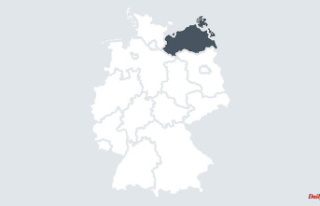Germany has a very high security of energy supply. Even in extreme cases, an uncontrolled collapse is not expected - things could only get tight for a short time.
Dresden (dpa/sn) - Due to the energy crisis in the coming winter, transmission system operators see an increased risk of impairments in the supply of gas and electricity in Saxony. An analysis known as a "stress test" has shown that load shortages can occur in individual, very critical hours if various negative effects come together, says CFO Dirk Biermann from 50Hertz (Berlin). "It's not particularly likely that we'll get into trouble, but it's also not so unrealistic that you shouldn't be very well prepared - and we are," he said.
"It goes without saying that saving electricity helps, even on a small scale," says Biermann. Many people and companies are already doing this. "If, in certain situations, there is a short-term demand for more electricity than is available and has to be reduced, we talk about a few hours, distributed throughout Germany". There, the load is then switched off temporarily, locally and in a controlled manner. Such structured shutdowns serve to "keep the entire power grid in balance and thus prevent worse things from happening."
Ontras Gastransport GmbH Leipzig does not assume that there are technical restrictions, "provided that gas quantities are available," says Managing Director Uwe Ringel. In most of the scenarios calculated by the Federal Network Agency at the end of August, the storage levels lasted until February, "if we can reduce our consumption". The balance sheets already show a smaller decrease of up to ten percent compared to previous winters. If we succeed in lowering the basic requirement now so that the storage tanks are not emptied so quickly, "we will create the conditions for at least making ends meet on the gas side in the winter", without major restrictions on the demand in the industry.
According to Ringel, there are also a number of customers who can go to oil or other alternative fuels. The necessary procedures for this would have to be accelerated so that they could switch to another energy source before the start of winter. If there were gas shortages in a certain region, transport would be reorganized to compensate. "But we are currently not assuming a shortfall."
According to Energy State Secretary Gerd Lippold (Greens), local and usually very short power supply interruptions occur again and again in the stable European grids. The effects on consumers are usually very manageable. "But these short-term power outages are something completely different from blackouts, i.e. long-lasting, widespread outages in large parts of continental Europe."
According to the ministry, in 2020 there were 19,900 interruptions lasting more than three minutes in Germany alone in the medium-voltage range, in 2019 there were 20,900, in 2018 there were still 23,700 and ten years ago 32,000 when, for example, excavators cut through the cables. The average power failure duration per consumer and year has dropped from over 20 minutes to 10.73 since 2006.
Network operator SachsenNetze also does not consider a large-scale power failure to be likely. Managing Director Steffen Heine says that the company is well positioned, even if there are a few major customers whose gas would have to be switched off and who then sometimes turned their increased demand to electricity. However, the simultaneous use of many fan heaters or electric ovens can lead to power failures in one or more houses or on a street.
Heine reports that some business customers are showing that they are saving gas, and that the saving effects for private consumers are sometimes greater than expected - around minus 15 percent for gas and 10 to 20 percent for electricity, depending on the region.
Dirk Sattur, Technical Managing Director of Mitnetz (Cottbus), currently sees a high level of stability in the gas and electricity network. In addition, private households saved because of the prices and large industrial customers stopped their production or drastically reduced their gas consumption to the bare minimum. "It is important that customers are credited for savings."












